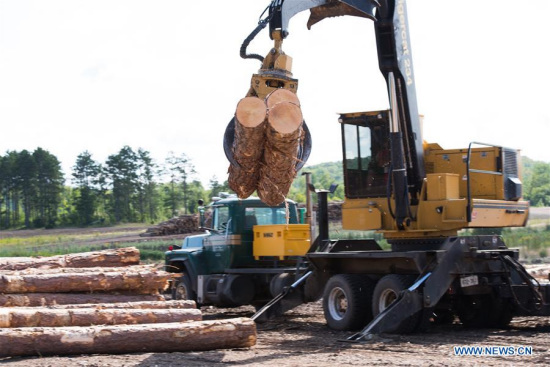
Logs are lifted for transportation at a lumber manufacturer of Murray Brothers Lumber Company in Ontario, Canada, on Aug. 16, 2017.
The United States, Canada and Mexico on Sunday wrapped up the first round of renegotiations on the North American Free Trade Agreement (NAFTA), pledging to continue a rapid pace of talks in the coming months to update the 23-year-old trilateral trade deal.
"Detailed conceptual presentations were made by the United States, Mexico and Canada across the scope of the agreement, and negotiating groups began work to advance text and agreed to provide additional text, comments or alternate proposals during the next two weeks," negotiators from the three countries said in a joint statement after concluding five-day talks here.
Negotiators will work to advance negotiating text through the end of August, and will gather in Mexico for a second round of talks from September 1-5, the statement said, vowing to keep a rapid pace of negotiations.
NAFTA negotiations will move to Canada in late September and return to the United States in October, with additional rounds being planned for the remainder of the year, according to the statement.
While acknowledging "a great deal of effort and negotiation will be required in the coming months", the three nations are committed to "an accelerated and comprehensive negotiation process" that will upgrade the trade deal and "establish 21st century standards" for global trade.
Despite that ambitious commitment, trade experts have expressed doubt about the quick conclusion of NAFTA talks due to the extensive agenda and contentious issues among the three countries.
"Because the agenda of the negotiations is so extensive, so comprehensive, it will be very difficult for the three countries to come together on agreement on this entire agenda of issues in the next few months," Jeffrey Schott, a trade expert and senior fellow at the Peterson Institute for International Economics, a Washington-D.C.-based think tank, told Xinhua in a recent interview.
As Mexico will have a general election in July 2018 and the U.S. congressional mid-term elections are slated for next fall, negotiators have hoped that NAFTA talks could be wrapped up by early next year.
"There will be delays caused by electoral considerations, which will limit the flexibility of negotiators to make commitments and compromises before votes are taken," Schott said, adding it's "very possible" that NAFTA negotiations "will still be ongoing in 2019".
The joint statement didn't offer details on the first round of talks, but negotiations are likely to become increasingly tense and difficult over the next few months.
The government procurement rules, rules of origin, domestic content requirements and dispute settlement are among the most contentious issues in the NAFTA renegotiations, according to Schott.
The Trump administration's "America First" strategy would also make Canada and Mexico reluctant to offer major concessions in the talks, analysts said.
U.S. Trade Representative Robert Lighthizer on Wednesday blamed the NAFTA for the huge trade deficits and the lost manufacturing jobs, while Canada and Mexico believe that the trade agreement is mutually beneficial for all three countries.
Lighthizer emphasized that President Donald Trump is not interested in "a mere tweaking of a few provisions and a couple of updated chapters," and the United States would seek "major improvement" of the NAFTA.
However, Mexico's Economy Minister Ildefonso Guajardo, during his opening remarks Wednesday, noted that for a deal to be successful, "it has to work for all parties involved-otherwise, its' not a deal."
"The issue is not tearing apart what has worked, but rather how we can make the agreement work better," Guajardo said.
U.S. media Politico also commented in a recent report that Trump's "America First" strategy will never be successful in NAFTA negotiations if it seen as "Mexico Second."


















































